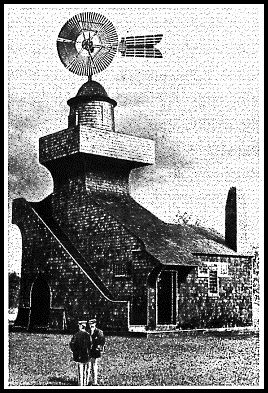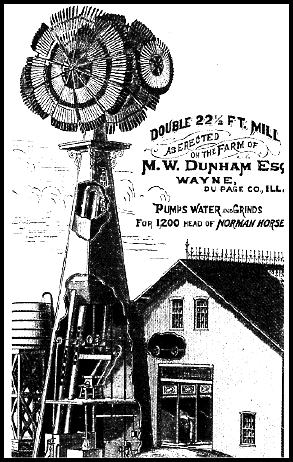 They say that there were two inventions that made it possible to develop the American West: barbed wire (also known as "barbwire" or "bobwire") --- and windmills. Windmills made it possible to get water from the extensive underground aquifers, thus giving locale and centrality to the herding of cattle. Wire made it possible to keep out trespassers, to lock in the assets, as it were: to isolate and claim ownership of the formerly wandering herds now gathered about the essential waters pulled from the deep.
They say that there were two inventions that made it possible to develop the American West: barbed wire (also known as "barbwire" or "bobwire") --- and windmills. Windmills made it possible to get water from the extensive underground aquifers, thus giving locale and centrality to the herding of cattle. Wire made it possible to keep out trespassers, to lock in the assets, as it were: to isolate and claim ownership of the formerly wandering herds now gathered about the essential waters pulled from the deep.T. Lindsay Baker identifies some 1500 manufacturers of windmills. We have names like The Dandy, Everlasting, Favorite, Boss Vaneless, Sandwich-Perkins, Fouk's Accelerating Air Motor, Parson's Colorado Wind Engine, The Iron Screw, and Aquarius the Water Bearer. The author wants to be endlessly knowledgeable on the subject, and given the grace and the beauty of so many of these windmills, who can blame him?
He gives complete description of the history, manufacture, construction, erection, maintenance, and mechanics of these giant machines. The inventor of the American model was one John Burnham, and they say he constructed and tested the first one in Ellington, Connecticut, in 1854.
You and I don't want to know everything there is to know about these behemoths (although it's all here); but what we do want to mosey through the pages, put together so lovingly --- three-hundred-seventy-six illustrations, photographs, excerpts from old ads, diagrams, and engravings. And there are so many varieties (one-hundred-twelve basic designs), and so many strange ones, as varied as the minds of those who engineered America's necessary turn-of-the-century love-affair with graceful machines: the sectional wheels, the solid wheels, the telescoped towers, the "Nebraska Spread," the self-oiling models, the Double Gears, the vaneless.
We can't fault a tome like this, can we? Because what it does is to freeze for us a chapter in astonishing early machinery that turned America from a range of nomads without borders into a fenced and contained sociopolitical amalgamation, the gestalt of this country out of the late 19th and early 20th centuries.
Early photographs and drawings such as these have the ability to capture us for a moment as, once in our seamed lives, we are on the plains, driving through Kansas or Texas or North Dakota or Missouri.
It is late afternoon. The road has created its own rhythm. We are on one of those journeys, the journey that all Americans have taken, either running away from something (family, failure, fear), or running to something (another job, another chance, another adventure). As we move across the plains, we are caught in that shriven moment of flight, in-motion, halfway across the great west-land --- halfway between here (wherever here may be), and there (we always think we know where there is going to be).
Out in the furtherest field, moving in the curling heat of mid-summer, surrounded by wheat moving ripe about it, stands the towering Star Model 24 self-oiling back-geared steel windmill, as manufactured and erected in 1928.
The vanes are moving ever-so-slowly. And we are moving ever-so-quickly across our land. We are here, in unity, safely distanced from whatever it is that we are leaving behind and beyond us, and over there, edged by the sun, casting a long shadow rippled on the crop beneath, stands yet another unity: our hope, our dream, our flight blended with moving vanes.
Standing breathed into poetry-magic, the metaphor of whatever we may think we are at that particular moment, going into whatever state of hope or fear or need, captured in whatever it is we think we might be finding (or have already found, or will never find), there comes that moving, so slowly rounding out our darkest dreams, our shining fantasies.
We know we must pass this vane symbol of ourselves, cast in primitive steel legs standing upright. We will pass, and pass all it speaks to: the point above marking the failing life of one especially not-so-special day of existence --- a day that may go on forever dying, when the sky turns from cornflower blue, into the humid night-blue-fruit, gone into blackness. The mill and its taciturn configuration are a standing message from whatever has become us on the stretch of our imagination --- full of silent winds, revolving against the self. Coupled with the two or three last clouds that point russet fingers flat across the horizon, we are plunged into a dying as rich as our labored childhood, which we must forever leave behind. Leaving behind silence --- leaving behind sound:
For if we stop, for a moment, out there on the darkening plain, stop in the keening aroma of moist wheat, the waves of sea-passioned essence, we can, too, hear the mermaids, crying into the darkness of us, with voices of steel grating against steel.
 As we wait, breathless, there beside the road, empty as our past days --- the color dark finally turns, revolves
into the that that has already passed, and at that moment, what is unknowable suddenly (again!) becomes the
first touch of our first love, and the russet cheeks, the first wrenching of the silent child borne within, our last turning as she lay soaked on the bier. Torn in this darkness, the keening halo of the motion which now has become us --- the crying spirit which we were seeking, which we will never know, which we must leave, a light russet at the far edge of the deepening.
As we wait, breathless, there beside the road, empty as our past days --- the color dark finally turns, revolves
into the that that has already passed, and at that moment, what is unknowable suddenly (again!) becomes the
first touch of our first love, and the russet cheeks, the first wrenching of the silent child borne within, our last turning as she lay soaked on the bier. Torn in this darkness, the keening halo of the motion which now has become us --- the crying spirit which we were seeking, which we will never know, which we must leave, a light russet at the far edge of the deepening.
We can now barely hear the pitch of it turning. As we resume our race across the flat black land, we find ourselves too passing, captured by the horizon, shadows now laced in the point of the sky.
And even as we know that we have been caught, we, too, are captured by the spasm of this day, one final passage through memory-in-flight. Beyond this seeing, beyond this hearing, the wings can never stop turning, and we are mounted on the back of the American Empyrean dream.
A dying vision, a dying wind, hope crystallize on the golden etch seeping beyond the wind --- a honeyed Zephyr turning itself into shadows --- to turn away all loss: the fecundity of passed arms of all loves living.
All we have come to hope for. All we have come to see. Which, in the last light turning, must be only ourselves.